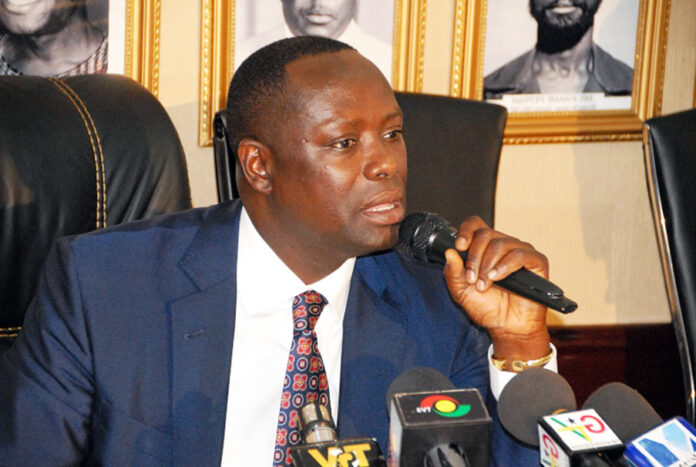The deputy Minority Leader and Member of Parliament (MP) for Ellembelle, Emmanuel Armah-Kofi Buah, has called for the immediate review of the Petroleum Revenue Management Act (PRMA), since its current form gives the Minister of Finance too much space and power to allocate revenues accruing from the country’s oil deposits without recourse to future generations.
A review of the PRMA, he noted, is a necessity, stressing that any amendment to the Act should target restricting the Finance Minister to use the oil money the PRMA allows him to channel into the Annual Budget Financing Amount (ABFA) for big ticket projects.
Contributing to the 2024 Budget statement and Economic Policy of the Government of Ghana on the floor of Parliament on Wednesday, November 22, 2023 the MP for Ellembelle said the annual support of the budget with oil revenues has not helped the country, since nobody could pinpoint what the oil money has been used for the past fifteen years after its discovery.
He said his call for the immediate review of the PRMA is based on a report by the Public Interest and Accountability Committee (PIAC) that states that the country’s oil was depleting and must be replenished.
“Mr. Speaker, today PIAC is saying that we are stack with three oil producing fields and it is declining, and for seven years we have not added one oil producing field to what already exists. In fact, what is critical is that just in 2020 alone oil revenue was US$1.43billion.
Exactly what have we used the oil money for? I take the exigencies of this debate to call on Members of Parliament (MPs) for us to revisit the Petroleum Revenue Management Act. Mr. Speaker, the power of the Finance Minister to play with the oil revenue must be stopped”, he noted.
He added, “If we ask ourselves today exactly what have we done with our oil revenues after almost fifteen years of discovering oil in commercial quantities and going into production afterwards, nobody will remember because we are just supporting the budget with the oil money.”.
He said it was important for the country to decide and or settle on using the oil revenue for big ticket projects like railways or superhighway projects like the construction of road infrastructure from Half-Assini to Wa and back to Accra in three hours.
“Mr. Speaker, can we create the Ghana superhighway with oil money in the next ten years? That is what I am calling for”, he added.
The Petroleum Revenue Management Act – PRMA- was enacted to govern the management of petroleum revenues. The PRMA is guided by one major principle: petroleum resources as stipulated in the Constitution belong to the people and are vested in the President in trust for and on behalf of the people of Ghana.
As such, all activities related to such resources must benefit the citizens of Ghana, which is why the law is potentially so important for national development.
At its core the PRMA defines the framework for accounting for receipts and expenditure from petroleum revenues. It also provides rules on investment and savings in line with industry practice.
The Annual Budget Funding Amount (ABFA) is the main channel through which petroleum revenues are used to support the budget. The PRMA calls for allocations to the ABFA to be guided by a medium-term development strategy aligned with a long-term national development plan.
Because Ghana lacks a long-term national development plan, the PRMA mandates that the ABFA should give priority to programs or activities relating to twelve areas.
The government can prioritise up to four areas when submitting a program of activities for the use of the petroleum revenue. This is to avoid a situation where a government attempts to tackle too many of these areas at the same time thus spreading revenues too thinly.
The 12 priority areas are Agriculture, Education, Science & Technology, Potable water, infrastructure development, public security and social welfare.
The rest are strengthening institutions, healthcare delivery, rural development, alternative energy, environmental protection and housing delivery.
However, Emmanuel Armah-Kofi Bua, a former Minister of Energy, said the guidelines for the allocation of the oil revenue give the Finance Minister too much space to play with the country’s oil revenue, since the allocations have been in piecemeal, something, he stressed, must be changed.
According to him, there have been some instances where the Finance Minister has allocated money for the construction of a toilet facility. However, when PIAC visited the supposed site for the toilet facility, nothing was found, a clear indication that the facility was not a priority of the people.
“So, as far as PIAC is concerned, the record is that there should be a toilet facility in that district and if they go and did not find that toilet facility, then that project does not exist.
“So, the Minister of Finance basically is more or less has the authority and I am saying that we should change that.
“We should use the oil money for big projects so that when the oil is finished, we can remember that the oil revenue was used for big ticket items. Unfortunately, we are not doing that”, he told members of the Parliamentary Press Corps at a press briefing moments after making his submission on the floor of Parliament.
By Stephen Odoi-Larbi









